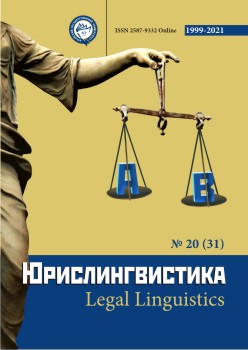The Principle of Gender Equality in the Texts of the Constitutions of Western European Countries
Abstract
The article analyzes the provisions of regulatory legal acts that ensure the enforcement of women's rights in Germany, Italy, Spain, Sweden, Finland, Iceland, etc. The paper shows the effectiveness of the Northern European approach to overcoming obstacles to gender equality through the establishment of special state agencies and government authorities. As generally recognized leaders in the field of women's rights this group of states effectively implements national mechanisms of gender equality. It is worth remembering that progress in achieving gender equality in Western countries is due to the intensity of the women's movement itself and the growth of women's representation in governments, parliaments and public organizations. Besides we should mention a broad anti-discrimination legislative framework and a system of state agencies implementing gender equality strategies in Europe. The systematic development of the concepts of equal opportunities has allowed women in these countries to take a secure place in the labor market on equal terms with men. The article shows that gender equality can be defined to a certain extent as a kind of "sameness" of men and women. However, this sameness should not be equated with identity. Alas, it is impossible to equate a woman and a man, at least the reason for this is mental and physiological differences, plus the obvious difference in their biological functions. It has proved that despite numerous benefits, women continue to face various forms of discrimination. Finally, as the experience of Western countries shows, to achieve equality de facto it is necessary to significantly increase the activity of women themselves, civil society institutions, to strengthen the role of state authorities in the implementation of true gender equality.
Downloads
References
Воронина О.А. Феминизм и гендерное равенство. М., 2004.
Воронина О.А Швеция: V периодический доклад о выполнении КЛДОЖ (2006) : реф. излож. // Гендерное равенство в современном мире: роль национальных механизмов / отв. ред. и сост. О.А Воронина. М.: Макс Пресс, 2008. С. 233-239
Закон о запрете дискриминации. URL: https: // lagen.nu/ 2008:567 (дата обращения: 01.04.2021).
Закон о равных возможностях. URL: https: // lagen.nu/ 1991:433 (дата обращения: 27.11.2020).
Конституции государств Европейского Союза. М, 1997.
Конституция Италии. URL: ttps: // legalns.com/download/books/cons/italy.pdf (дата обращения: 27.11.2020).
Конституция Польши. URL: http://www.concourt.am/armenian/legal_resources/world_constitutions/constit/p oland/poland-r.htm дата обращения: 27.11.2020).
Королева Т.А. Обеспечения равенства женщин в Финляндии: специфика гендерной политики // Среднерусский вестник общественных наук. 2012. № 4 (1). С. 134-138.
Лошакова Ю.П. Защита прав женщин в контексте гендерного равноправия (На материалах законодательства Швеции) // Женщина в российском обществе. 2011. № 2. С. 57.
References
Voronina O.A. (2004) Feminism and Gender Equality. Moscow (in Russian).
Voronina OA (2008) Sweden: V periodic report on the implementation of CEDAW (2006): ref. set out. // Gender equality in the modern world: the role of national mechanisms / otv. ed. and comp. OA Voronina. Moscow (in Russian).
Anti-Discrimination Act. URL: https: // lagen.nu/ 2008: 567 (date of access: 01.04.2021).
Equal Opportunities Act. URL: https: // lagen.nu/ 1991: 433 (date accessed: 27.11.2020)
The constitutions of the states of the European Union (1997). Moscow (in Russian).
Italian Constitution. URL: ttps: // legalns.com/download/books/cons/italy.pdf
Constitution of Poland. URL: http://www.concourt.am/armenian/legal_resources/world_constitutions/constit/poland / poland-r.htm
Koroleva T.A. (2012) Ensuring equality of women in Finland: specificity of gender policy // Srednerusskiy vestnik obshchestvennykh nauk.. No. 4 (1) Moscow (in Russian).
Loshakova Yu.P. (2011). Protection of Women's Rights in the Context of Gender Equality (Based on Swedish Legislation) // Woman in Russian SocietyNo. 2. Moscow (in Russian).
Copyright (c) 2021 Александр Головинов

This work is licensed under a Creative Commons Attribution 4.0 International License.
The authors, which are published in this journal, agree to the following conditions:
1. Authors retain the copyright to the work and transfer to the journal the right of the first publication along with the work, at the same time licensing it under the terms of the Creative Commons Attribution License, which allows others to distribute this work with the obligatory indication of the authorship of this work and a link to the original publication in this journal .
2. The authors retain the right to enter into separate, additional contractual agreements for the non-exclusive distribution of the version of the work published by this journal (for example, to place it in the university depository or to publish it in a book), with reference to the original publication in this journal.
3. Authors are allowed to post their work on the Internet (for example, in a university repository or on their personal website) before and during the review process of this journal, as this may lead to a productive discussion, as well as more links to this published work (See The Effect of Open Access).











